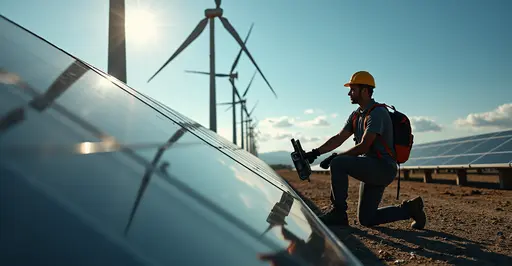
Global Renewable Energy Workforce Faces Major Skills Shortage
The latest Future of Jobs Report 2025 from the World Economic Forum reveals a critical skills gap in the renewable energy sector that threatens to derail the global green transition. According to the comprehensive study involving over 1,000 leading global employers representing more than 14 million workers, skill gaps are now considered the biggest barrier to business transformation, with 63% of employers identifying them as a major obstacle.
Rapid Growth Meets Workforce Challenges
The renewable energy sector is experiencing unprecedented growth, with climate-change mitigation ranking as the third-most transformative trend overall. The report shows that 47% of employers expect climate-change mitigation to transform their business by 2030, driving demand for roles such as renewable energy engineers, environmental engineers, and electric and autonomous vehicle specialists.
"The green transition is creating millions of new jobs, but we're facing a critical shortage of skilled workers," said Dr. Elena Rodriguez, a renewable energy workforce development expert. "Without immediate investment in training and education programs, we risk slowing down our progress toward net-zero goals."
Key Findings from the Report
The Future of Jobs Report 2025 projects that job creation and destruction due to structural labor-market transformation will amount to 22% of today's total jobs by 2030. This includes the creation of 170 million new jobs, offset by the displacement of 92 million current jobs, resulting in net growth of 78 million jobs.
Technology-related roles are the fastest-growing jobs in percentage terms, including big data specialists, fintech engineers, AI and machine learning specialists, and software developers. Green and energy transition roles feature prominently among the top fastest-growing positions.
Skills Transformation Required
On average, workers can expect that 39% of their existing skill sets will be transformed or become outdated over the 2025-2030 period. While this represents a slowdown from previous years (down from 44% in 2023), the scale of workforce transformation remains significant.
AI and big data top the list of fastest-growing skills, followed closely by networks and cybersecurity, and technology literacy. Environmental stewardship has entered the report's list of top 10 fastest-growing skills for the first time, reflecting the growing importance of sustainability expertise.
Industry Response and Training Initiatives
In response to these challenges, 85% of employers surveyed plan to prioritize upskilling their workforce. Companies are implementing various strategies, including:
- 70% expect to hire staff with new skills
- 40% plan to reduce staff as their skills become less relevant
- 50% plan to transition staff from declining to growing roles
Supporting employee health and well-being is expected to be a top focus for talent attraction, with 64% of employers identifying it as a key strategy to increase talent availability.
Global Implications and Policy Recommendations
The skills gap has significant implications for global climate goals. According to the International Renewable Energy Agency (IRENA), achieving net-zero emissions by 2050 will require creating 38 million jobs in renewable energy alone by 2030.
"We need coordinated action between governments, educational institutions, and private industry," said Michael Chen, Director of Workforce Development at the Global Wind Energy Council. "Public-private partnerships are essential for developing the training programs needed to build the renewable energy workforce of the future."
Funding for reskilling and upskilling are seen as the two most welcomed public policies to boost talent availability, according to the report. Many countries are already implementing national training initiatives, with the European Union's Green Deal Industrial Plan and the United States' Inflation Reduction Act including significant workforce development components.
As the world accelerates toward renewable energy adoption, addressing the skills gap will be crucial for ensuring that the green transition creates inclusive economic opportunities while meeting climate targets.

 Nederlands
Nederlands
 English
English
 Français
Français
 Deutsch
Deutsch
 Español
Español
 Português
Português








